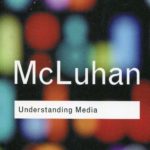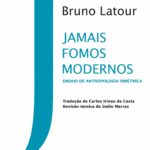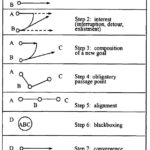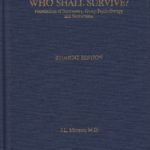![Ciberespaço e vida eletrônica segundo Bruce Sterling (1994 [1992]) Ciberespaço e vida eletrônica segundo Bruce Sterling (1994 [1992])](https://www.laspa.slg.br/wp-content/uploads/2021/05/sterling-capa-639x1024.png)
Ciberespaço e vida eletrônica segundo Bruce Sterling (1994 [1992])
STERLING, Bruce. 1994. The hacker crackdown: law and disorder on the electronic frontier. Library Freeware. [1992]
CIBERESPAÇO
A science fiction writer [William Gibson] coined the useful term “cyberspace” in 1982. But the territory in question, the electronic frontier, is about a hundred and thirty years old [referência à invenção da telefonia por Bell]. Cyberspace is the “place” where a telephone conversation appears to occur. Not inside your actual phone, the plastic device on your desk. Not inside the other person’s phone, in some other city. *The place between* the phones. The indefinite place *out there,* where the two of you, two human beings, actually meet and communicate. (Sterling 1994:11)
People have met there and been married there. There are entire living communities in cyberspace today; chattering, gossipping, planning, conferring and scheming, leaving one another voice-mail and electronic mail, giving one another big weightless chunks of valuable data, both legitimate and illegitimate. They busily pass one another computer software and the occasional festering computer virus. (Sterling 1994:12)
[John Perry] Barlow was the first commentator to adopt William Gibson’s striking science-fictional term “cyberspace” as a synonym for the present-day nexus of computer and telecommunications networks. Barlow was insistent that cyberspace should be regarded as a qualitatively new world, a “frontier.” According to Barlow, the world of electronic communications, now made visible through the computer screen, could no longer be usefully regarded as just a tangle of high-tech wiring. Instead, it had become a *place,* cyberspace, which demanded a new set of metaphors, a new set of rules and behaviors. The term, as Barlow employed it, struck a useful chord, and this concept of cyberspace was picked up by *Time,* *Scientific American,* computer police, hackers, and even Constitutional scholars. “Cyberspace” now seems likely to become a permanent fixture of the language. (Sterling 1994:249)
TELEFONIA COMO GÊNESE do CIBERESPAÇO
The community of telephone technicians, engineers, operators and researchers is the oldest community in cyberspace. These are the veterans, the most developed group, the richest, the most respectable, in most ways the most powerful. Whole generations have come and gone since Alexander Graham Bell’s day, but the community he founded survives; people work for the phone system today whose great-grandparents worked for the phone system. Its specialty magazines, such as *Telephony,* *AT&T Technical Journal,* *Telephone Engineer and Management,* are decades old; they make computer publications like *Macworld* and *PC Week* look like amateur johnny-come-latelies. (Sterling 1994:29)
DO ELETROMECÂNICO ao ELETRÔNICO
Over the first half of the twentieth century, “electromechanical” switching systems of growing complexity were cautiously introduced into the phone system. In certain backwaters, some of these hybrid systems are still in use. But after 1965, the phone system began to go completely electronic, and this is by far the dominant mode today. Electromechanical systems have “crossbars,” and “brushes,” and other large moving mechanical parts, which, while faster and cheaper than Leticia, are still slow, and tend to wear out fairly quickly. […] But fully electronic systems are inscribed on silicon chips, and are lightning-fast, very cheap, and quite durable. They are much cheaper to maintain than even the best electromechanical systems, and they fit into half the space. And with every year, the silicon chip grows smaller, faster, and cheaper yet. Best of all, automated electronics work around the clock and don’t have salaries or health insurance. (Sterling 1994:42)
BARATO ELETRÔNICO
Here are some excerpts from “The Conscience of a Hacker,” by “The Mentor,” from *Phrack* Volume One, Issue 7, Phile 3. “I made a discovery today. I found a computer. Wait a second, this is cool. It does what I want it to. If it makes a mistake, it’s because I screwed it up. Not because it doesn’t like me.(…) “And then it happened… a door opened to a world… rushing through the phone line like heroin through an addict’s veins, an electronic pulse is sent out, a refuge from day-to-day incompetencies is sought… a board is found. ‘This is it… this is where I belong…’ “I know everyone here… even if I’ve never met them, never talked to them, may never hear from them again… I know you all…(…) “This is our world now…. the world of the electron and the switch, the beauty of the baud. (Sterling 1994:93-4)
A TEMPORALIDADE ELETRÔNICA do CIBERESPAÇO
Three years in cyberspace is like thirty years anyplace real. It feels as if a generation has passed since I wrote this book. In terms of the generations of computing machinery involved, that’s pretty much the case. (Sterling 1994:313)
The electronic landscape changes with astounding speed. We are living through the fastest technological transformation in human history. (Sterling 1994:322)





 O LaSPA é sediado no Instituto de Filosofia e Ciências Humanas (
O LaSPA é sediado no Instituto de Filosofia e Ciências Humanas (